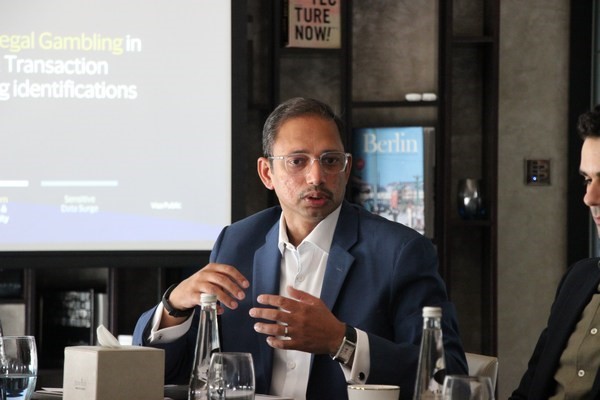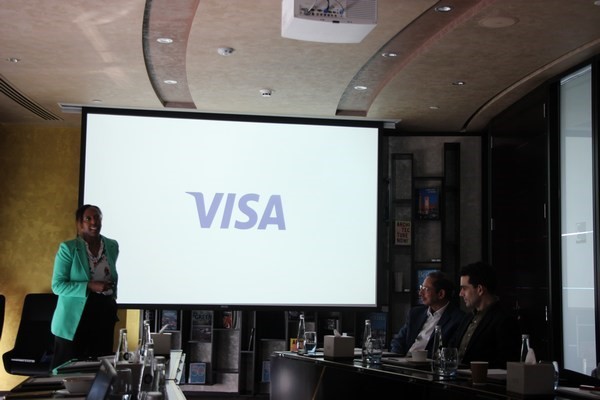Visa Security Summit 2024: Shaping the Future of Digital Commerce Security
Jordan News
last updated: Mar 13,2024

DUBAI — In the heart of Dubai, on March 6th and 7th,
the Visa Security Summit 2024 unfolded as a landmark event, drawing over 350
leaders from across 50 markets in Central and Eastern Europe, the Middle East,
and Africa. This annual gathering wasn't just a meeting of minds but a vibrant
platform where C-suite executives and pivotal decision-makers from the realms
of banking, retail, and cutting-edge fintech came together. Over two
enlightening days, through a series of keynotes, discussions, and collaborative
sessions, the summit turned into a crucible for innovative ideas and strategies
aimed at redefining the security landscape of digital commerce.
This convergence was more than an event; it
was a forward-thinking journey led by Visa's global and regional executives,
along with the brightest in payments and risk management. Together, they
tackled the evolving challenges and opportunities in safeguarding digital
transactions, making the summit a beacon for the future of secure commerce.
Let's dive deeper into the insights and
breakthroughs shared at the media round table, understanding how Visa and its
partners are steering a new paradigm in transaction security.

Steering
the New Security ParadigmAdapting
to Digital Growth: Insights from Charles Lobo
The swift transition to digital commerce,
significantly accelerated by the pandemic, has reshaped how we transact daily.
Charles Lobo, Visa's Regional Risk Officer for CEMEA, provided a compelling
overview of this transformation. He highlighted that, even as face-to-face
transactions make a comeback, the allure and convenience of eCommerce continue
to draw in consumers, marking a notable shift away from cash and fostering
inclusive growth by integrating more individuals into the digital economy.
Interestingly, this surge in digital
transactions hasn't led to a proportional increase in fraud, thanks to advanced
payment technologies like contactless payments and tokenization, which bolster
transaction security. Yet, the battle isn't won. Consumers remain the prime
targets of sophisticated cyber threats, underscoring the need for continuous
education and preventive measures to safeguard their digital experiences in an
increasingly complex payments landscape.
A 2023 survey conducted by Visa's Stay Secure
campaign across 17 CEMEA markets unveiled some startling revelations. Despite a
majority feeling confident in their ability to spot scams, a staggering 90%
failed basic fraud detection tests. This discrepancy between perceived and
actual scam awareness points to an overconfidence that can be costly.
Furthermore, a significant number would engage with scam messages, and only a
third scrutinize communication for fraud indicators—this puts a spotlight on
the consumer as a critical vulnerability in the security chain.
Rising
Cyber Threats and Visa's Proactive Measures
The landscape of cyber threats is constantly
evolving, with the region witnessing a spike in sophisticated fraud tactics
like purchase return authorization attacks, ransomware, and enumeration
attacks. Visa's response has been swift and robust, employing AI-driven models
and investing billions in technology to counteract these threats effectively.
Yet, as technology advances, so do the methods of fraudsters, with deep fakes,
voice cloning, and polymorph malware presenting new challenges.
The integrity and complexity of the payment
ecosystem have also expanded, evidenced by a significant increase in registered
payment facilitators and a rise in transaction laundering cases. In light of
these developments, tokenization has become an indispensable security measure.
Visa's commitment to protecting consumer data is evident in the 4.5 times
growth in network tokenization, significantly outpacing the increase in
credential-on-file merchant volume. Yet, with 84% of consumers demanding
reassurances on data protection before shopping online, the need for heightened
security measures and transparent communication is more critical than ever.
Key Takeaways: Empowering a Secure Ecosystem
- AI at the Forefront: Visa is leveraging AI to efficiently analyze vast datasets, identifying fraud patterns and threats with remarkable precision.
- Strengthening Cyber Defenses: Through Risk-as-a-Service and partnerships with cybersecurity experts, Visa is enhancing its ability to predict and mitigate risks.
- Building on Trust: Adjusting programs to fit the dynamic payments landscape, Visa remains committed to fostering trust at the core of its operations, ensuring the integrity of the payment ecosystem.
In navigating the new security paradigm,
Visa's approach combines cutting-edge technology, expert collaboration, and a
deep understanding of the evolving threat landscape to protect consumers and
merchants alike.

Spot
a Scam – Understanding the Evolving Landscape
Cybercrime's
Growing Threat: Insights from Michael Jabbara
In a startling projection shared by Michael
Jabbara, Visa's Global Head of Fraud Protection, cybercrime is expected to cost
the global economy a whopping $10.5 trillion annually by 2025. To put this into
perspective, if cybercrime were a country, its economic impact would rank third
globally, trailing only the United States and China. This staggering figure
underscores the urgency and scale of the threat we face.
Cybercriminals exploit vulnerabilities using a
two-pronged approach: targeting large service providers with network breaches
and ransomware, and deploying sophisticated social engineering tactics to
deceive individual cardholders. The tools of their trade have become more
accessible and potent, thanks to open-source technology. Today, fraudsters can
easily craft convincing marketing materials and develop fraudulent scripts with
community-provided coding assistance, creating an ecosystem that supports and
amplifies cybercrime.
The
Consumer Frontline and Visa's Countermeasures
The complexity and frequency of scams aimed
directly at consumers are on the rise, with estimated financial losses reaching
$1 trillion in 2023 alone. Imposter scams, online shopping frauds, and
deceptive prize or lottery schemes are becoming increasingly common, preying on
the trust and inexperience of consumers. A survey in the CEMEA region revealed
that over half of the respondents have fallen victim to online scams, with 15%
experiencing multiple incidents.
To combat this escalating threat, Visa has
dedicated over $10 billion in the last five years to deploy state-of-the-art
technology, expertise, and processes aimed at identifying and mitigating fraud.
The company's strategy involves integrating security at the network level and
leveraging technology to address human vulnerabilities, such as gullibility to
scams. By analyzing vast amounts of transaction data in real time, Visa can
pinpoint and prevent fraudulent activities before they inflict financial damage.
Future
Outlook: Staying Ahead of Scammers
As we look ahead, the tactics employed by
fraudsters will undoubtedly become more sophisticated, leveraging advancements
in technology to target consumers more effectively. Visa anticipates that these
criminals will continue to exploit human vulnerabilities, orchestrating scams
with a global reach and an unprecedented level of organization.
Key Takeaways: Visa's Commitment to Consumer Empowerment
Visa's strategy to counter the threat of
cybercrime and fraud centers on empowering consumers and enhancing security
across the board:
- Personalized Security: Through tools like Visa Transaction Controls, consumers gain the ability to specify which types of transactions are allowed, adding a layer of personalized security.
- Innovative Authentication: Visa is developing solutions that make verification processes more intelligent without compromising convenience.
- Secure and Convenient Payments: The adoption of tokenization technology ensures that payments are not only faster but also more secure, aligning with consumer expectations for ease and safety.
- Zero Liability Promise: At the heart of Visa's brand is a commitment to consumer protection, guaranteeing that customers are not held responsible for unauthorized transactions.
By fostering an environment where security and
consumer empowerment go hand in hand, Visa aims to build trust in digital
commerce and ensure that the benefits of technological advancement are
accessible to all, without the looming threat of fraud.

Talking
Tokens, Transacting Trust
Building
Digital Trust with Tokenization: Insights from Mehret Habteab
In the ever-evolving landscape of digital
commerce, trust is not just a commodity but a necessity. Mehret Habteab, Head
of Products and Solutions at Visa Europe, underscored this point, highlighting
how consumer expectations have shifted towards not just convenience and choice
but also the assurance of security and privacy. Today's consumers, particularly
younger generations like Gen Z and Gen A, prioritize brand values,
sustainability efforts, and the feeling of being supported in times of
uncertainty. This shift indicates a broader trend: the search for trust and
validation, not just from the brands themselves but from their communities and
influencers, especially in financial decisions.
Tokenization:
A Cornerstone of Visa's Security Strategy
Amidst this backdrop, tokenization emerges as
a critical pillar in fostering trust in the digital realm. By replacing
sensitive card information with unique digital tokens, tokenization
significantly enhances transaction security, mitigating the risk of fraud.
Habteab elaborated on the transformative impact of this technology, not just in
boosting sales conversion by over 5% but also in reducing fraud rates by 30-50%
for tokenized transactions compared to their non-tokenized counterparts.
Tokenization's benefits extend beyond
traditional payment environments. Its applications are diverse, ranging from
facilitating seamless in-car payments to enabling personalized holiday shopping
experiences, demonstrating its adaptability and the control it offers to
consumers over their payment preferences.
The
Future of Commerce: Trust, Tokenization, and Collaboration
Looking ahead, the role of tokenization in
shaping the future of commerce is undeniable. It stands at the intersection of
trust, data security, consumer choice, and enhanced experience, providing a
robust framework for secure digital transactions. As the digital commerce
ecosystem evolves, Visa's commitment to innovation, collaboration, and
education remains steadfast. The company is not just responding to current
trends but actively shaping the future, ensuring that the digital commerce
landscape is secure, inclusive, and aligned with consumer expectations.
Key Takeaways: Envisioning a Trusted Commerce Ecosystem
- Trust as the Currency of the Digital Age: In the digital commerce landscape, trust is paramount. Visa's efforts in education, innovation, and security are geared towards building and maintaining this trust, ensuring that consumers feel confident in their digital transactions.
- Revolutionizing Security with Tokenization: Tokenization is at the forefront of Visa's strategy to enhance payment security. By replacing sensitive card details with digital tokens, it offers a more secure transaction environment, reducing fraud rates and increasing sales conversions.
- Empowering Consumers with Choice and Control: The shift towards digital commerce is driven by consumer demand for personalized and seamless experiences. Visa's focus on tokenization and other technologies supports this demand, providing consumers with more control over their payment methods and enhancing their overall experience.
- Collaboration is Key to Future Success: The future of commerce requires a collaborative approach. Visa is committed to working with partners across the ecosystem to introduce innovative solutions that meet evolving consumer needs, ensuring a secure, convenient, and trustworthy digital commerce environment for all.
Visa's vision for the future of commerce is
one where security and convenience converge, supported by the bedrock of trust.
Through tokenization and a collaborative approach to innovation, Visa is
leading the charge in creating a digital commerce ecosystem that is secure,
inclusive, and ready for the challenges and opportunities of tomorrow.
Read more Business
Jordan News

